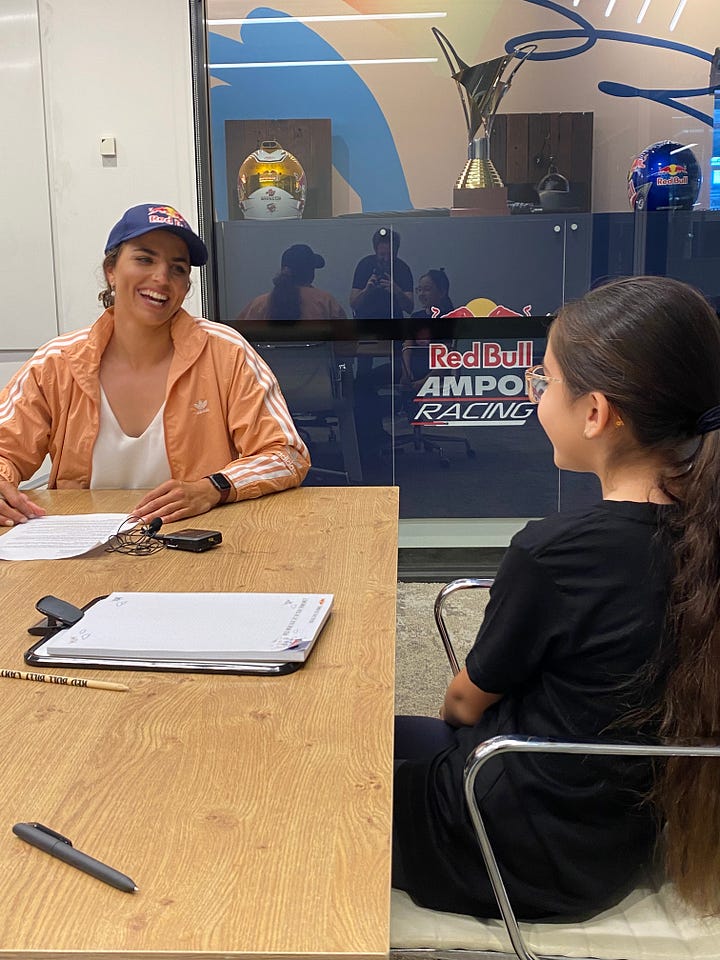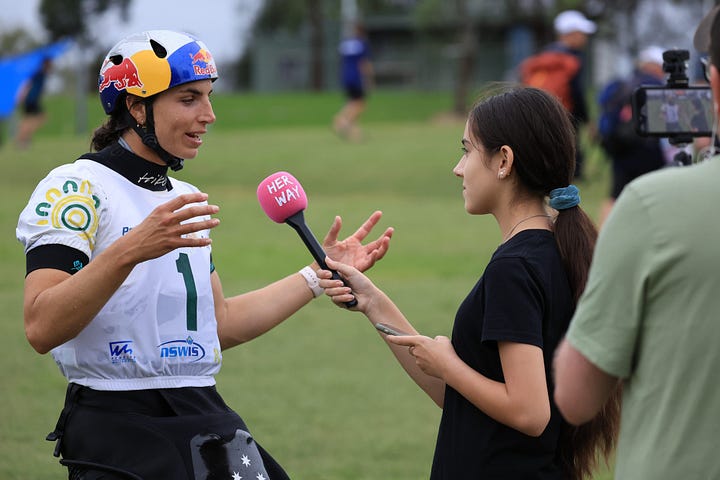FRIDAY FLASHBACK: Jess Fox
After being named a flag bearer for the Australian team in Paris, HER WAY recounts its first interview with Canoe Slalom star Jess Fox in December 2021.




Jess Fox is one of the most universally admired athletes in Australian sport. As she prepares to lead the Australian team at the Opening Ceremony in Paris, take a trip down memory lane to December 2021 when I first met and interviewed the GOAT of paddling. She greeted me with a hug, and had brought her Tokyo gold medal along which she let me wear. We then sat down for a 20 minute chat, where I asked the girl who grew up in Penrith about her upbringing and how she became the greatest Canoe Slalom paddler of all time. It was a fun and friendly vibe - at one point Jess was distracted by a cute dog which walked past the window, while on another occasion she turned the tables by taking my clipboard and asked me a question. Here is some of that chat.
What kind of a kid was Jessica Fox?
I was a sporty kid. I played all the sports at school - T-ball, netball and all those ones at primary school, and outside of school I did a lot of swimming and gymnastics. I'd come home from school and I'd do some kind of sport and then do a bit of homework, but I was always just pretty active and loved being outside. I broke my arm when I was 11, and my physio said I should do some rehab by paddling. So that's how I ended up getting into paddling.
You and I are similar in that we both have a sister a couple of years younger! It looks like you get along really well as adults. Was it always like that when you were kids?
I think we were always pretty close. We did fight when were younger - we had little bickering times, but I think generally we got along pretty well. She started paddling a little bit later than I did, but we're super close and we're like best friends. She's also a competitor, and we're very competitive with each other.
When you were a kid, who were your idols and role models?
I had lots of different ones. I think I was always inspired by other Olympian athletes. I remember watching the 2000 Games and seeing Cathy Freeman, but I was quite young - I was six then. And I remember watching the 2004 Games and seeing Anna Meares, and Jodie Henry, and these women who were just kicking goals. And I actually met Anna and saw her gold medal, and that really inspired me as a 10 year old (as I was back then), to dream about being an Olympian.
Have you ever not loved paddling?
I started paddling with my parents on weekends but I didn't like it because it was with them, but when I was old enough to go in the whitewater, that's when I really started to love it. And I made some friends my age, and I also started competition, and I really liked competition and I started winning a few races and that kept me going. I think I'm lucky that I love training and I love racing. So there are hard sessions, but there have never been moments where I've wanted to quit because it's been too hard, because I think I've had races where I've not won, not performed like I wanted to and I've been really upset, but that's all part of it, and I knew it was part of the journey that was going to help me achieve bigger things.
You seem to be really good friends with a lot of fellow competitors. Is that true?
Yeah. I think we're really fortunate that we've got a great community feeling in our sport, and I've known a lot of the girls since we were juniors, so we've become good friends. Once we're on the start line we're all competitive, but at the finish line we can celebrate each others' performance and the winners and the medal winners and those who have done great races, so I think that's important.
Which are you competing against the most - the opponents, the course, or your mind and body?
Ooh great question. I think your own mind and body, because you can do whatever your own mind says you can do. Sometimes your biggest enemy is your own mind. There are times when the course is really hard and challenging and intimidating, and I think for me, I need to trust that I have the skills to do a course, and trust that I've got the mental skills to do the course. Because at the end of the day you've just got to do your best race and see the result at the end.
I think anyone who watched the race where you won the gold medal in Tokyo will remember that moment after you crossed the line where you slapped the water and screamed. What was going through your mind at that exact moment?
It was all the emotion from the past few days, and joy and relief and pride that I'd pulled it off and done a race that I was so happy with and proud of. I think I was really, really proud that I did a great race and won the gold medal, as opposed to winning with an average race. It was a really good feeling to know that I'd pulled out one of the best races of the games in my sport. Because that run in the C1 would've won the kayak, and that's never happened before, so it was really special.
When exactly did it sink in that you were a gold medallist?
I think standing behind the podium and they were calling out the silver and the bronze and then they said "Champion Jessica Fox" and I got emotional and I saw the gold medal and put it around my neck... it was a pretty special moment.
The C1 event which you won the gold for, was a race you had fought long and hard to be included for women. Why that was so important to you?
So I started paddling in 2008 in the canoe. Back then there was only one event for women and three for the men. So the lobbying started then, because we wanted to get in Rio 2016 to have the same events for the men and women. But it took a long time to get through that process to overcome the mindset that the women couldn't do the canoe event, that they weren't good enough, that they didn't have the right technique. And so I think it was just about pushing and constantly reminding people that this was important, and so to finally be there in Tokyo was so special, because we were the first ones to represent our countries in the canoe.
I’ve been lucky enough to meet and interview Jess about half a dozen times since that day - at awards nights, after finishing races, and in more casual settings. I’ve also asked her for contributions to articles I’ve written, and each time, no matter where in the world she is, Jess has always said yes and kept her word. She has always been generous with her time, and has been a great supporter of HER WAY.
Having also met and interviewed mum Miriam and sister Noemie on several occasions, not to mention dad Richard, it’s clear to see that the entire Fox family are a treasure to Australian sport. They’re an integral part of the success of the Canoe Slalom program in Australia. Having attended a couple of events at the Penrith whitewater course, I’ve seen Jess and family walk the course cheering fellow paddlers as much as anyone else, even when preparing for a big race of their own.
Canoe Slalom has undoubtedly given Jess Fox a lot over the years, but there’s also no doubt that Canoe Slalom, particularly in Australia, owes a lot to Jess as well.



